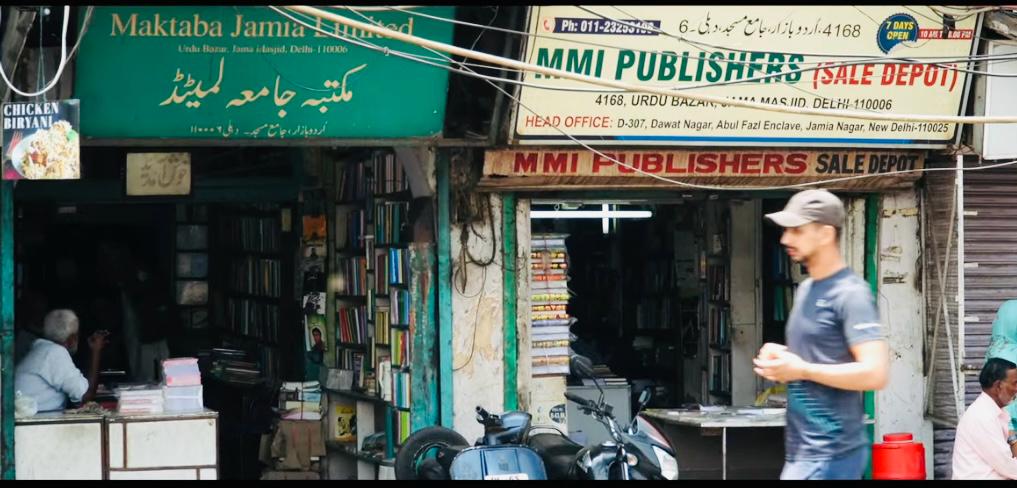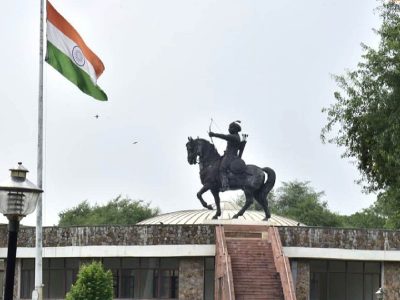As you move towards Jama Masjid from Daryaganj, you hear the sound of azaan (Muslim call to prayer) coming from the 1656-built gigantic mosque. It is time for the Zuhr namaaz (noon prayer) and the area is springing to life. After a couple of minutes, you cross the building of the now-closed Jagat cinema on your way to Urdu Bazar.
The character of what was once the bastion of bookshops of Urdu on all subjects under the sun is changing fast. If you are visiting there after a few years, you would observe a sea change as many former bookshops (also known as kutubkhana) are now occupied by rows of shops selling meat delicacies.
As a book lover, you would dearly miss the smell of the printed word. The tempting aroma of kababs and a variety of chicken would not impress you. Not more than five bookshops are there in Urdu Bazar now, down from around 30 almost 15 years ago. It is anybody’s guess for how long the remaining kutub-khanas would survive.
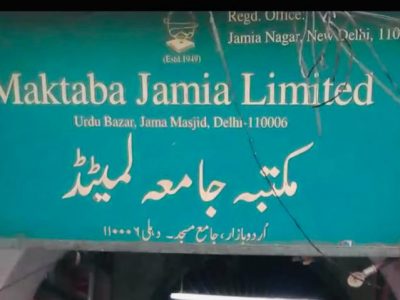
Says social worker and advocate Masroor Hasan Siddiqi, “It is sad to see Urdu Bazar is dying in times of Jashn-e-Rekhta. The shops that were thronged by lovers of Urdu are shutting down swiftly. Those who were into book-selling business are disposing of their space to those who sell mutton, chicken and fish items.” Siddiqi claims that the local authorities have quietly even changed the name of Urdu Bazar Road. The signboard denoting the road is also not there. Now, this road has been renamed as Jama Masjid Road. “I really do not know as to why the old name of Urdu Bazar Road was changed. It was absolutely unnecessary,” he feels.
Indeed, it is a fact that people have earned huge money after selling their space in Urdu Bazaar. There was a time when one could spot the likes of Bashir Badr to Munawwar Rana and Delhi’s very own Gulzar Dehalvi and others scanning books at some kutubkhana or talking to each other in animated manner.
These acclaimed shayars (poets) need no introduction. Originally, Urdu Bazaar was located at Dariba Kalan and was almost destroyed during the 1857 mayhem. So hurt was Mirza Ghalib with the destruction of Urdu Bazaar that he lamented, “My dear man, when Urdu Bazaar is no more, where is Urdu? By God, Delhi is no more a city, but a camp, a cantonment. No fort, no city, no bazaars.”
Not only from Delhi, but book lovers from across India visit to buy books on literature, architecture, history, religion, poetry, music and other subjects. Moreover, prestigious Urdu journals and magazines were available in Kutub Khanas. “Now, the remaining 4-5 Kutub Khanas sell only books on religion. They get very few customers. Seriously, they are also toying with the idea of either selling their space or giving it to some kababwala to earn quick buck,” says Mohammad Taki, who runs a library near Jama Masjid.
Can you imagine that noted writers Sadat Hasan Manto and Krishan Chander were not visiting the Kutub Khanas during their frequent visits to Jama Masjid area when both of them were working for the Urdu service of All India Radio (AIR) inthe early 1940s. They were working for AIR in early 1940s, and would visit Jama Masjid area more often than not. It goes without saying that at least some of their time would be spent in Urdu Bazaar. After visiting Kutub Khanas like Aziza, MMI Publishers, Kutub Khana Anjuman-e- Taraqqi-e-Urdu and Zulfiqar Book Depot, Maktaba Jamia Limited, one gets the feeling that now they do not get many customers.
In these cold days of Delhi, their business is not very warm. Says Rizwan, a salesman at Zulfikar Book Depot, “Our business has been declining steadily. We have to evolve to survive. Sadly, there are not many buyers of Urdu books here.” Founded in 1939, the landmark Kutub Khana Anjuman-e-Taraqqi-e-Urdu bookshop gets visitors in search of rare books from across the world. “Whenever any friend of mine from Pakistan would visit me in Delhi, I’d buy books for him from Kutub Khana Anjuman-e-Taraqqi-e-Urdu. It is such a landmark bookshop. I only pray to God that this shop survives for another 100 years,” says Prem Bhutani, who was working for BHEL till recently.
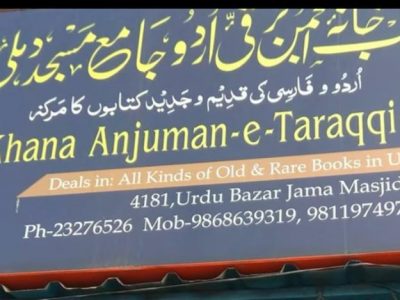
There was a time when the towering Congress leader and former Chief Executive Councillor of Delhi Mir Mushtaq Ahmad would organise discussions on current affairs and literary issues inside the office of Maktaba Jamia Limited. All those programmes were attended by a
very large number of people from Delhi-6. Mushtaq Ahmed was a freedom fighter with a socialist outlook.
On November 1, 1945, he arrived at Connaught Place with the Congress flag in his hand and unfurled it, singing Vande Mataram. For several decades, Azad Kitab Ghar, Central Book Depot, Chaman Book Depot, Deeni Book Depot, Ilmi Kitab Ghar, Kutub Khana Hamidia, Kutub Khana Naziriya, Kutub Khana Rashidia, Lajpat Rai and Sons, Maktaba Akhlaqia, Maktaba Burhan, Maktaba Ishat-ul-Quran, Maktaba Shahrah, New Taj Company, Sajid Book Depot, Sangam Kitab Ghar have served the cause of book lovers with love and care. They are all shut and have been replaced by restaurants selling non-vegetarian cuisine.
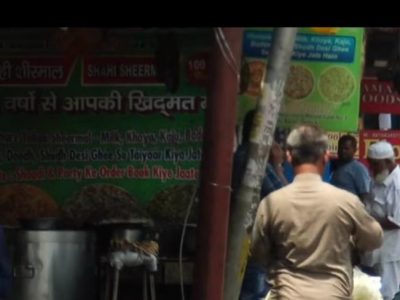
Unlike bookshops, the restaurants get a lot of customers from across Delhi-NCR. The whole area glitters beyond midnight. People mainly come here using metro train. Well, Urdu Bazaar was not only about Kubub Khanas only. It hosted the life and soul of political activities of walled city as well. The Congress, Samajwadi Party and CPI had their offices here. BJP had its office in Ajmeri Gate though. Mir Mushtaq Ahmad and MO Farooqi, the general secretary of CPI, were often found there talking with their comrades. Later, they would sit in some Kutub Khana for chit-chat. The best thing about the shops of Urdu Bazaar was that they also sold second-hand books at throwaway prices. That was also a huge attraction for the readers.
“Unfortunately, things have changed fully due to social media. Now even book lovers prefer to read on their mobile rather than books.
We used to get lot of tourists too. Those who visit Jama Masjid also visit us. Now, we hardly receive such customers,” says a salesman of
Madina Book Depot, which is still there. Urdu Bazaar was not all about Kubub Khanas only. One cannot overlook the once bustling Suleman Tea Stall located here. It was a meeting point for book lovers and shayars for many, many decades. Suleman Tea Stall would remain open till past midnight and was adjacent to Karim Hotel. But it shut down about a decade ago. Gulzar Dehalvi sahib used to tell us that shayars like Kaiser Hyderi, Kunwar Mahendra Singh Bedi, Mukhtar Usmani, Heera Lal Falak and others were regular at Suleman Tea stall along with their fans. They were all from Delhi. “They all visited book shops of Urdu Bazaar and later sat for hours together at Suleman Tea Stall and talked endlessly. That was also the meeting point for them before going to attend a mushaira (poetry session). They all wore kurta pyjama with Nehru jacket or sherwani,”recalls Taki Mohammad.
As you exit Urdu Bazaar and moveout of Delhi-6 from Chitli Qabar and Bulbulikhaha side, another thing strikes you. That almost all the
boards of shops there are either in English or Hindi. Urdu is not even there on boards as it used to be asrecently as a couple of years ago.

